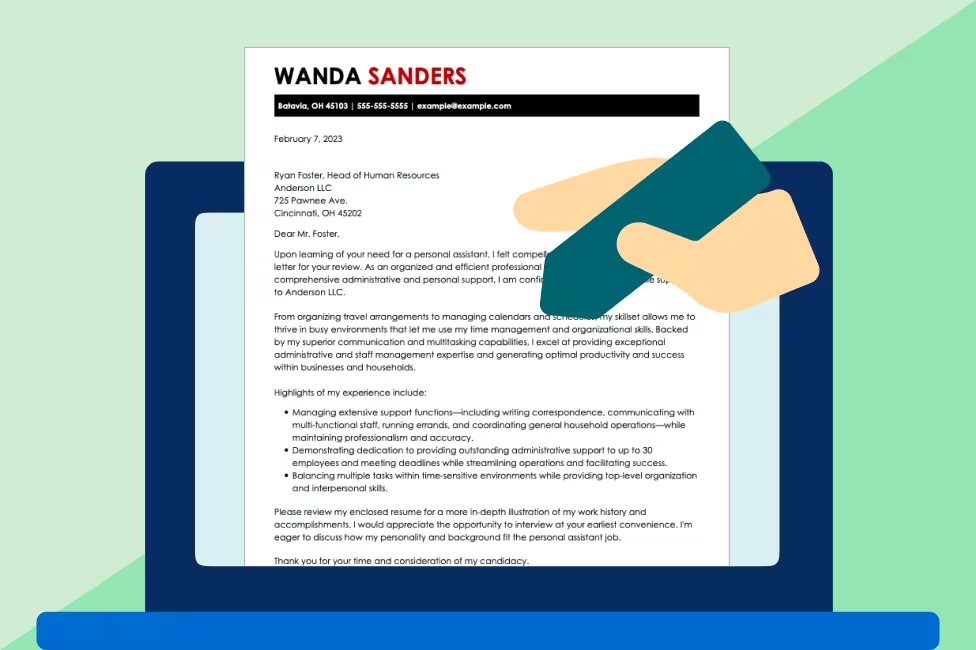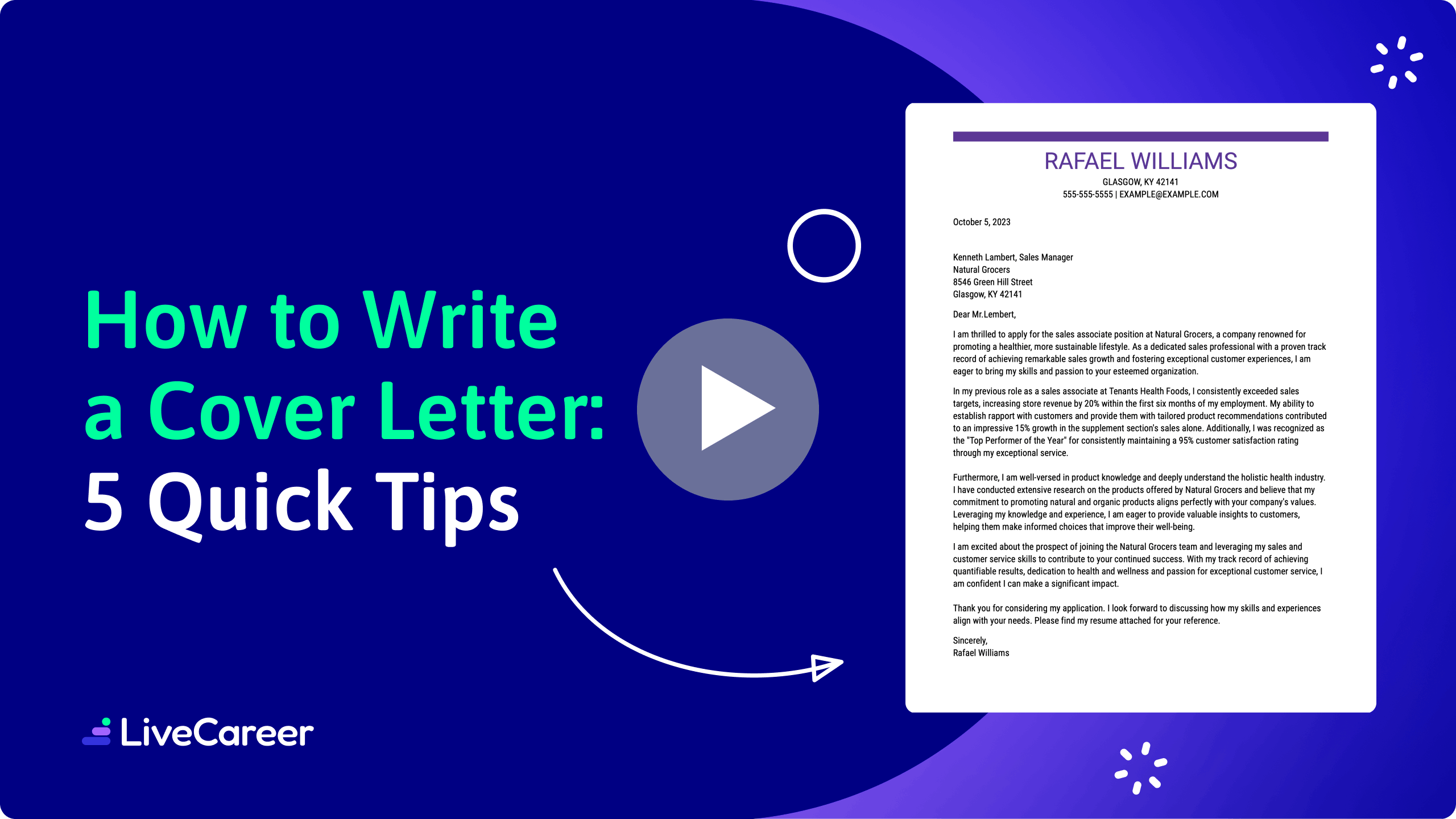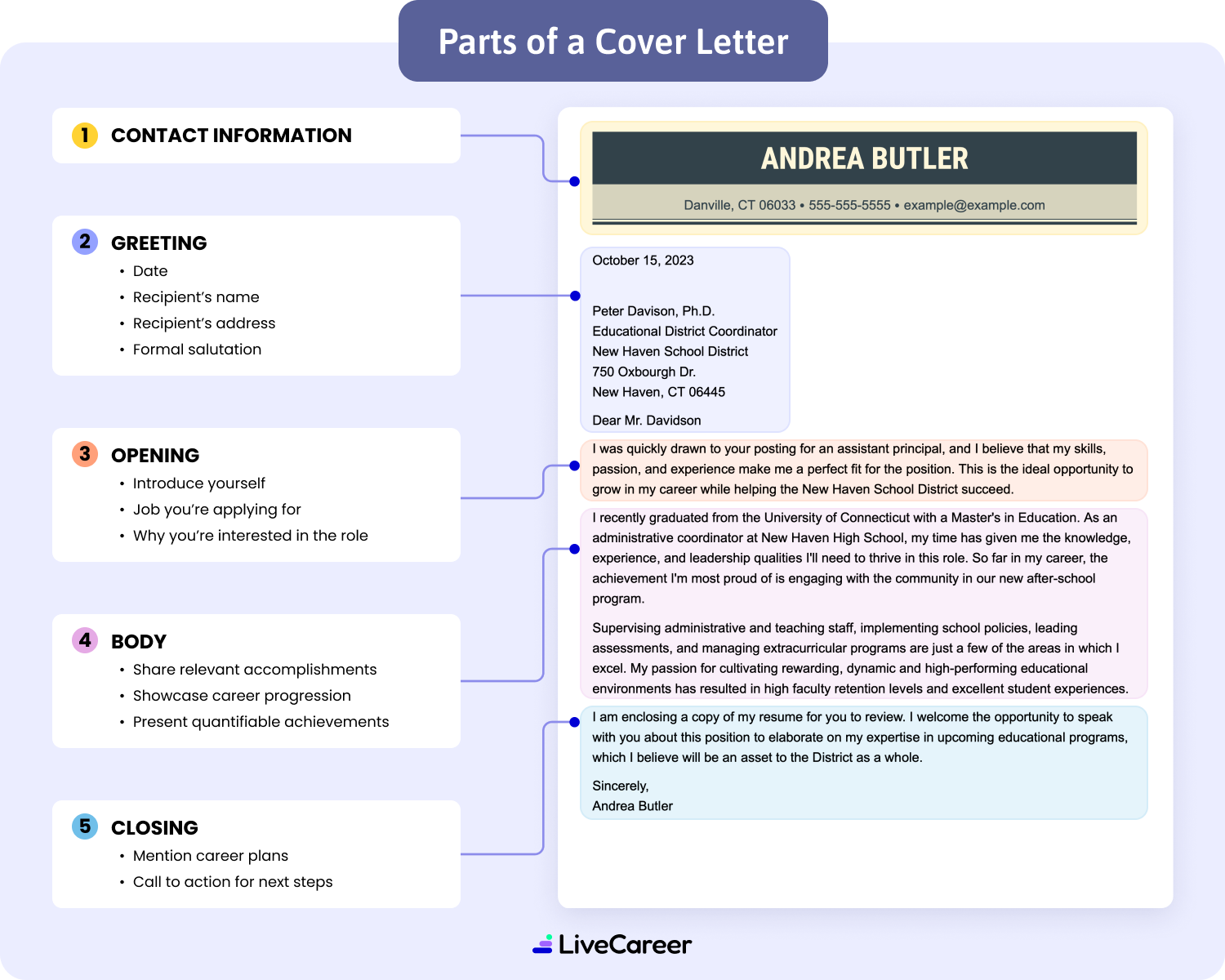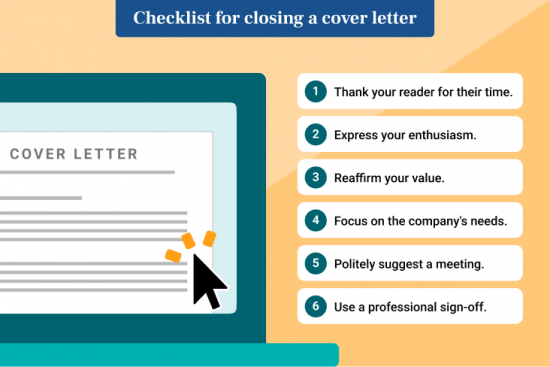How to Write a Cover Letter in 8 Easy Steps, Plus Examples
Learn how to write a cover letter that lands you an interview by focusing on the key sections, tailoring it to your target job, and using professional templates and cover letter examples.
Hired By:*


Although many job seekers question the relevance of cover letters today, there’s no denying that everyone should learn how to write a cover letter—especially because the majority of employers consistently request one in their job advertisements.
Because we understand that the job application process is already time-consuming even without a cover letter, we’ve created this simple, easy-to-follow guide for writing a polished and compelling letter. If you’re ready to take control of your job search and put your best foot forward, let’s dive in.
Press play to watch a quick video on how easy it is to write a cover letter step-by-step using LiveCareer’s professional Cover Letter Generator!
What Is a Cover Letter, and Why Is It Important?
A cover letter is one of the standard job application documents. Alongside a well-written resume or curriculum vitae (CV), it helps you submit a complete job application by providing more details about who you are as a professional and why you’re the right fit for a specific job.
A professional cover letter’s fundamental sections are its header, the introduction paragraph, one or two body paragraphs, and the closing paragraph or conclusion.
For your cover letter to be successful and capture the attention of recruiters, it must:
- Include two to three examples of your top achievements
- Tell a story of your skill level and career path
- Explain why you’re a good fit for the role and company
Include any relevant details you can’t fit in your resume or CV.
PRO TIP
A great cover letter can pique a hiring manager’s interest. 83% of recruiters will interview candidates with great cover letters! If you’re serious about a job, include one.
How to Write a Cover Letter
Here, we’ll explain how to write a cover letter for a job in eight easy steps.
STEP 1
Research the job.
Before writing your cover letter, you must understand your target audience. Hiring managers want qualified candidates who understand the job’s responsibilities and possess the key skills and experience to fulfill the role.
- Carefully read the job description. Look for keywords in the job ad that identify the immediate needs of the role.
- Study the company’s About Us page, Mission Statement, or press coverage. Hiring managers want candidates who fit the company culture, so write about your commitment to the same goals.
- Be direct. Focus on one or two reasons why you’d be a great addition to their team.
STEP 2
Pick a cover letter template.
Templates are preformatted designs that save you time and effort when writing your letter. These professionally designed cover letter templates come with pre-set margins, font sizes, and line breaks, allowing you to add and customize your information quickly.
Best of all, they’re designed to pass applicant tracking systems (ATS), which most companies use to scan your cover letter for keywords.
STEP 3
Write a professional header.
Your cover letter’s header should include:
- Your name
- Location (city and state)
- Phone number
- The date on which you plan to send the letter
- Name and job title of the hiring manager
- Name and address of the company you’re applying to
- Your current job title (optional)
- Your LinkedIn page (optional)
- Links to your professional social media accounts (optional)
Professional header example:
Sophia Han
Boston, MA
555-555-5555
example@example.com
Jan. 1, 2025
Michael Ross
Senior Recruiter – Tech Solutions Inc.
123 Maple Lane
Boston, MA
555-555-5555
example@example.com
STEP 3
Greet the hiring manager.
If your research was successful, you should be able to address your cover letter to the hiring manager by name. This small detail highlights your attention to detail and research skills.
Avoid generic greetings like “Dear Sir or Madam.” These impersonal greetings can feel lazy or templated, which is the last feeling you want to inspire. You want to impress employers with a personalized approach. For example:
Good cover letter greeting examples:
“Dear hiring manager,”
“Dear [XYZ Company] team,”
“Dear Customer Acquisition Hiring Manager,”
Weak cover letter greeting examples:
“To whom it may concern,”
“Dear sir,”
“Dear Madam,”
STEP 5
Write a compelling opening paragraph.
In one or two sentences, introduce yourself and share your interest in the role with a strong opening paragraph. Add a quick line about how your previous experience prepared you for the job.
If you’re a direct referral, mention the employee’s name so hiring managers can quickly verify and fast-track you.
To write a good cover letter introduction, include:
- Profession/current job title
- Desired position
- Motivation for applying
Compare these examples:
Good example of a cover letter opening paragraph:
“After seven years working in marketing as a brand manager in multinational companies like P&G and Unilever, I want to use my negotiation and extensive knowledge of retail operations to expand your company’s market as a sales representative.”
Why this cover letter opening works:
In just one sentence, this applicant informs a potential employer of their years of experience, area of expertise, the role they wish to pursue, and the skills to back up their career aspirations.
Weak example of a cover letter opening paragraph:
“Hello. I am Lester Peterson. I hope you are doing well. I am writing to you because I want to apply to your company. I am a determined professional with all the qualities needed to excel in this role.”
Why this cover letter opening doesn’t work:
Although this job seeker sounds interested, they don’t share relevant skills or experience. You can improve this introduction by pulling skills from the job description or sharing a relevant achievement.
STEP 6
Prove your value in the body paragraphs.
The body of your cover letter, which should be one or two paragraphs long, should expand on your career achievements without repeating your resume.
Turn your resume accomplishments into a story by highlighting challenges and successes, such as boosting sales, securing key clients, or managing significant projects. You can also use strategic cover letter formats, like bulleted lists, so managers can quickly skim and find key information.
Explore these examples for inspiration:
Body paragraph example focused on career accomplishments:
“In my previous teaching role, I carved out 10-minute slots in my senior class to do SAT prep testing, resulting in having the district’s highest SAT score average in English. My dedication to my students’ needs has always been my priority, and students responded with increased participation in the portion of the class allotted for the syllabus topics. After being named Teacher of the Year, I organized a continuing education and mentorship program for newly graduated teachers in the school district.”
Body paragraph example focused on skill set:
“Throughout my career as an accountant, I have acquired skills in various areas of accounting and finance. In my first years, I worked in the public sector, developing budgets between $50,000 and $2 million and ensuring accounting records complied with federal and state regulations. Eventually, I moved to work in private equity firms. I gained firsthand experience in financial analysis in tech investments and monitoring funds’ investments, preparing all financial statements, and presenting to investors and stakeholders.”
Body paragraph example focused on career goals:
“After graduating from Columbia School of Social Work and volunteering in various non-profit organizations focused on at-risk youth and women’s shelters, I’m eager to put my skills to work as a counselor in the court system. My understanding of vulnerable children’s needs and challenges has inspired me to continue my career supporting children through their caregivers’ or their court proceedings.”
PRO TIP
If you find your body paragraph is becoming too long, use bullet points to break up blocks of text.
Body paragraph example with bullet points:
“In my current role as sales lead, I’ve attracted several local businesses in various industries and brought financial gains to our company and clients. Notable achievements in this capacity include:
- Adding 14 new accounts to our portfolio.
- Improving client retention rate by 47% over four years.
- Negotiating and renewing longer contracts with current clients, increasing net revenue by 11%.”
If you want your cover letter to impress a hiring manager, your body paragraph must be full of job-relevant skills and achievements—and written like a pro.
Our Cover Letter Generator will suggest over a dozen body paragraph examples you can choose from to wow employers.
You can edit these content suggestions with quantifiable achievements and keywords from the job ad to make your cover letter unforgettable.
STEP 7
Write a closing paragraph with a call to action.
Your closing statement should be concise and direct, leaving the reader excited to learn more about you.
Make sure your cover letter closer is:
- One or two sentences long
- Direct about your eagerness to fill the role
- Encouraging the reader to set up an interview
Good example of a cover letter closer:
“Let’s discuss my plans to contribute to XYZ Company’s mission to impact women professionals in their search for investment opportunities and financial education resources as Head of Marketing Operations. Thanks for your time in reading my application.”
Why this cover letter closing works:
This closer proves the candidate wants to have a serious discussion with a manager by getting specific. It offers both value and respect to the hiring manager.
Weak example of a cover letter closer:
“All in all, you won’t likely find a better candidate than me. My qualifications and experience will knock it out of the park. Let me know when you can meet with me for an interview.”
Why this is a weak cover letter closing:
Although supremely confident, this statement lacks substance, and the tone is off-putting. It’s demanding instead of polite and friendly.
STEP 8
Sign off and mention any enclosures.
Your cover letter’s sign-off consists of two words at most. Plenty of signatures will make you sound like a pro, and others you should avoid.
Good cover letter sign-offs:
Keep it formal and professional with these signature lines:
Sincerely,
Most sincerely,
Regards,
Best regards,
Kind regards,
Thank you,
Thank you for your consideration,
Respectfully,
Poor cover letter sign-offs:
Avoid informal phrases you would use with friends:
Take care,
Take it easy,
Have a great day,
Love,
Yours,
Yours truly,
Cheers,
Best,
Warm wishes,
Affectionately,
Warmly,
XOXO
Emojis
Thanks,
Thx, or any other abbreviation
Enclosures
Add a double space below your signature if you attach extra documents like a portfolio or recommendation letter. Write “Enclosure:” for one document or “Enclosures:” for multiple documents, then list each item below.
Enclosures example:
Sincerely,
Tom Smith
Enclosures:
- Portfolio
- Letter of recommendation
Key Takeaways
To recap the main points of how to write a good cover letter, keep these tips in mind:
- Write a fresh, custom cover letter for every job you apply to.
- Keep it to three to four paragraphs under one page.
- Use your cover letter to expand on details in your resume and tell a story.
- Ensure your document is free of errors.
Since your cover letter matters as much as your resume, you want to take this seriously! That’s why you should consider using our best tool for the job, the Cover Letter Generator.
The builder will suggest ready-made text tailored to the job you’re applying for. You can select it and customize it in your cover letter. These phrases ensure you sound professional and capable.
Best of all, since the builder automates the process, you can complete your letter in just a few minutes!
Cover Letter Writing FAQ
How do I write a cover letter if I don’t have experience?
The cover letter is especially beneficial for inexperienced job seekers, because it allows them to contextualize their skills and provide reassurance about their hirability to employers. Learn how to write a cover letter with no experience by following these tips:
- Emphasize educational accomplishments (relevant coursework, projects, extracurriculars).
- Mention non-traditional work experiences like internships, freelance work, or personal projects.
- Spotlight soft skills like leadership, communication, and accountability.
How long should a cover letter be?
Keep your cover letter to 250-400 words, one page, and three to four paragraphs. Any longer, and hiring managers might not spare the time to read it.
Can I write a cover letter with no manager’s name?
If you have checked the job description, company directory, social media channels, and employer review sites without luck, you can skip the manager’s name.
We strongly recommend adding the manager’s name because it shows your attention to detail and seriousness about the role. But if you can’t find it, use these professional greetings instead:
- “Dear Hiring Manager,”
- “Dear Hiring Team”
- “Dear [Department Name] Manager”
Should you send a cover letter by email?
Yes! You can copy and paste the body of your cover letter into an email.
Is a cover letter necessary?
A cover letter helps you to introduce yourself, explain your interest in the role, and showcase how your skills align with the job. Not all hiring managers require them, but cover letters can help them find strong candidates with matching experience.
What are the goals of a cover letter?
The goals of a cover letter are to introduce yourself, explain why you want the role, and convince hiring managers why you’re a great fit.
Hopefully, by explaining yourself clearly, you’ll connect with the employer and increase the likelihood that they’ll give you a job.
What does an employer look for in a cover letter?
Employers are looking for two main things in cover letters:
- That you have the skills and experience necessary to do the job
- A little insight into your personality and what motivates you to apply for this role
What do I write in a cover letter?
Your cover letter should focus on your motivation for applying for the role and the reason(s) why you feel like you’re a good fit.
If you can tell a story that illustrates you have the skills the employer seeks, even better!
How do I write a cover letter for an internship?
When writing a cover letter for an internship, you should:
- Cite the internship position you want
- Mention the required skills from the internship advertisement or post
- List relevant coursework or projects that show you’re capable
- Explain your motivations and career aspirations
- Emphasize what the company can gain from your unique abilities
How do I format a cover letter?
Cover letters follow a standard business letter format. Include the following sections to format a cover letter accurately:
- Your contact information and the recipient’s information
- A greeting for the hiring manager
- An opening paragraph that mentions the job you want and your top reasons for believing you’re a good fit
- One or two body paragraphs (you can use bullet points) showcasing your qualifications
- Closing statement with a request for an interview
- A signoff like “Best regards” or “Sincerely”
- Your name and signature
What is the best cover letter template?
The best cover letter template frames your experience but doesn’t distract from your accomplishments. We designed over 25 customizable templates to help you kickstart your application. Find them in LiveCareer’s Resume Builder and Cover Letter Generator to make a professional resume and empower your job search.
What are some cover letter mistakes?
Double-check that your document avoids these common cover letter mistakes:
- Has lengthy paragraphs: Keep your paragraphs to five sentences or fewer. Use bullet points to break your letter into easy, bite-sized statements.
- Rehashes your resume: Your cover letter should expand, not repeat, your resume. Share how to meet a specific goal and explain how it prepared you for the new job.
- Doesn’t include numbers to describe achievements: Numbers capture attention. Dollar amounts, numbers, or percentages offer proof of your achievements.
- Uses your current company’s email: It looks like you’re using company time to apply for jobs, which can put off recruiters and flag you at your current company. Use a personal, professional email instead.
- Mentions salary: Don’t mention salary in your cover letter unless the job post requests it. In some states, it’s illegal for employers to ask about your salary history.
- Is generic: Each job you apply to deserves a fresh, tailored cover letter. Pay attention to the job post or ad details to better understand what the employer wants to hear.
How We Reviewed This Article
Over the past 15 years, we’ve helped more than 10 million job seekers build stronger cover letters, discover their career paths, interview confidently, and boost their chances of finding the right job faster. Review our Editorial Policy to learn more about our process.

















